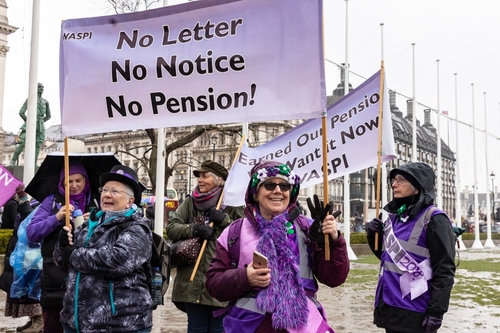The Government has confirmed it will not pay compensation to the 3.6m ‘Waspi’ women born in the 1950s who claim they were given insufficient warning about increases to their state pension age.
This decision overturns a recent Parliamentary Ombudsman report which recommended compensation of between £1,000 and £2,950 to those affected.
The Work and Pensions Secretary Liz Kendall apologised for the 28-month delay in sending letters, but said there was “considerable awareness” of the changes. She added there was no evidence of “direct financial loss” resulting from this decision to increase the state pension age.
The so-called ‘Waspi’ campaign (women against state pension inequality) has been running for more than a decade, calling for compensation of up to £10,000. Chair of this campaign group Angela Madden called today’s decision an “insult”.
“The government has today made an unprecedented political choice to ignore the clear recommendations of an independent watchdog. This is a bizarre and totally unjustified move which will leave everyone asking what the point of an ombudsman is if ministers can simply ignore their decisions.”
Madden’s concerns were echoed by a number of people in the pensions industry. LCP partner and former pensions minister Steve Webb descried the DWP’s decision as an “extremely worrying precedent”.
He added: “If it is acceptable for a Department to completely reject the findings of a report by the independent Parliamentary Ombudsman, this strikes a blow at the heart of the whole process.
“There is a risk that governments will now feel emboldened to ‘pick and choose’ when faced with a critical Ombudsman report, effectively setting themselves up as judge and jury.
“Even if the government felt it could not afford to implement the recommendations in full, there were many options which would have offered some redress to those most affected. Outright rejection of the Ombudsman’s report raises much wider issues than compensation over pension age changes, and MPs should not take this decision lying down”.
Prime Minister Sir Keir Starmer said he understood the concern of the Waspi women, but had to take into account whether it was right “to impose a further burden on the taxpayer”. It had been estimated that the compensation suggested by the Parliamentary Ombudsman could cost the Government a total £10.5bn.
At the centre of this debate was the position of millions of women who faced a succession of increases to their state pension age. The1995 Pensions Act aimed to increase the state pension age from 60 to 65, to bring it in line with the SPA for men. Initially the plan was to increase this in stages from 2010 to 2020.
But the coalition government of 2010 accelerated these increases, raising women’s SPA to 65 by 2018. Under the 2011 Pensions Act the new qualifying age of 65 for women was brought forward to 2018. The SPA was then raised for both men and women to 67. This was implemented in stages between 2018 and 2020, with further staged increases to 67 planned between 2026 and 2028.
